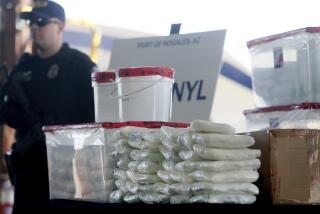Libya Plant Adds Urgency to Paris Talks
- Share via
WASHINGTON — With world attention focused on charges that Libya is building a giant poison gas plant, Secretary of State George P. Shultz and a high-level U.S. delegation leave today for Paris and a 130-nation conference intended to revive a seemingly moribund international ban on the use of chemical weapons.
When scheduled last fall, well before the current crisis with Libya began, the conference was designed to rekindle the worldwide abhorrence of chemical warfare that U.S. officials believe was eroded by Iraq’s regular--and militarily effective--use of gas in its eight-year-long Persian Gulf War with Iran.
But that objective was overshadowed Wednesday when U.S. warplanes shot down two Libyan fighters, escalating what previously had been a war of words between Washington and Tripoli over a giant industrial complex in the desert about 40 miles southwest of the Libyan capital. The Libyan government calls the complex a pharmaceutical plant, but the United States says it is a factory to produce chemical weapons, possibly for use by terrorists.
Not on Official Agenda
William F. Burns, director of the Arms Control and Disarmament Agency and vice chairman of the U.S. delegation, said Wednesday that the Libyan plant will not be on the official conference agenda. However, he said Shultz and other U.S. officials are sure to discuss the issue with other delegates in the corridors and around the edges of the formal meetings.
He made clear that the United States hopes to convince the rest of the world that the Libyan plant is so dangerous that it must be eliminated, preferably by the Libyans themselves. In the likely event that the Libyans refuse to dismantle the plant, Burns said, a U.S. military attack “is always an option.”
Burns said Libya’s army lacks the skill to make widespread, effective use of chemical weapons. However, if the plant at Rabta ever goes into full-scale production, Libya could become “a supplier of those weapons to countries that might want to use them (or) they could supply those weapons to terrorists,” he said.
Although terrorists have not made extensive use of chemical weapons, poison gas could be a devastating weapon in their hands, academic experts on terrorism say.
Despite the potential threat, the issue of the Libyan plant does not fit neatly into the Paris meeting, which was called to reaffirm the international protocol, signed in 1925, that banned the use of chemical weapons after the horrors of World War I gas warfare.
The protocol prohibits the use of poison gas but not its manufacture, sale or stockpiling. Therefore, Burns conceded, the Libyan plant is not illegal under the protocol. However, he argued, any nation or group of nations could take action against the plant under the U.N. Charter’s guarantee of the right of self-defense.
Burns said the United States has three objectives for the conference: a resolution restating without change the 1925 protocol, a statement calling on the long-running Geneva disarmament conference to consider a verifiable ban on poison gas production and stockpiling and an agreement to enhance the power of the U.N. secretary general to investigate suspected instances of poison gas use.
But even if the conference approves all three U.S. proposals, Burns said, there still will be no enforcement provisions. He said that even under the U.S. proposal, the United Nations would be unable to conduct investigations in nations that refuse to cooperate.
“This protocol is not the kind you might put teeth in, per se,” Burns said. He said economic sanctions could be imposed against nations that use poison gas, although “I doubt that that will be discussed at the conference.”
Some believe the conference was intended to expiate the guilt felt by the United States and some other Western nations for failing to do more to prevent the use of chemical weapons in the Iran-Iraq War. One U.S. official said Washington muted its condemnation of Iraq’s use of poison gas because the United States feared that the Baghdad regime would be defeated if it did not use chemical weapons. The United States wanted the war to end, as it ultimately did in a truce last August, without a clear winner or loser.
More to Read
Sign up for Essential California
The most important California stories and recommendations in your inbox every morning.
You may occasionally receive promotional content from the Los Angeles Times.













